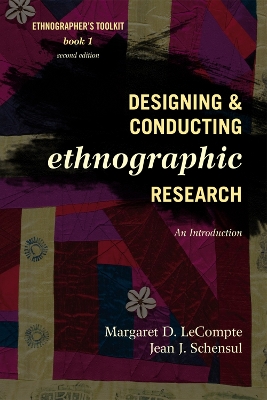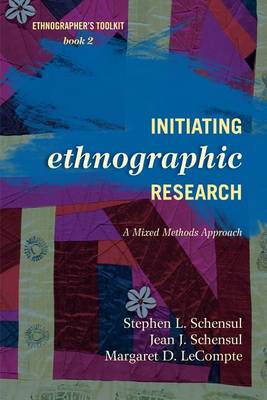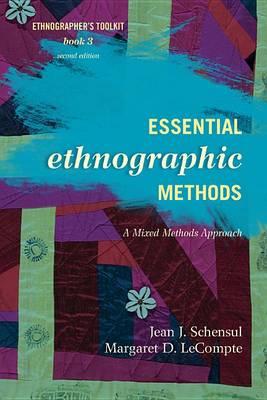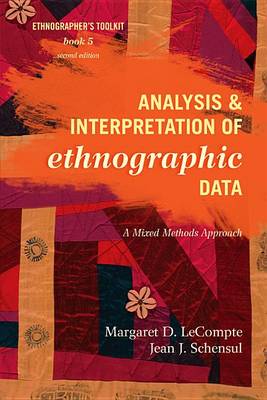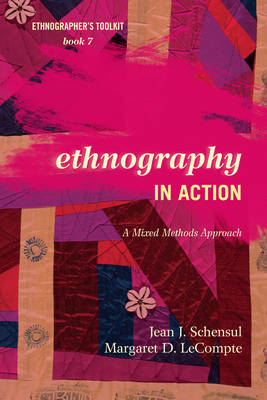Ethnographer's Toolkit, Second Edition
6 primary works
Book 1
Designing and Conducting Ethnographic Research
by Margaret D LeCompte and Jean J Schensul
Published 19 August 1999
This is Book 1 of 7 in the Ethnographer's Toolkit, Second Edition.
The Ethnographer's Toolkit series begins with this primer, which introduces novice and expert practitioners alike to the process of ethnographic research, including answers to questions such as who should and can do ethnography, when it is used most fruitfully, and how research projects are carried out from conceptualization to the uses of research results. Written in practical, straightforward language, this new edition defines the qualitative research enterprise, links research strategies to theoretical paradigms, and outlines the ways in which an ethnographic study can be designed. Use Designing and Conducting Ethnographic Research as a guide to the entire Toolkit or as a stand-alone introduction to ethnographic research.
Other books in the set:
Book 2:
Initiating Ethnographic Research: A Mixed Methods Approach
by Stephen L. Schensul, Jean J. Schensul, and Margaret D. LeCompte
9780759122017
Book 3:
Essential Ethnographic Methods: A Mixed Methods Approach, Second Edition
by Jean J. Schensul and Margaret D. LeCompte
9780759122031
Book 4:
Specialized Ethnographic Methods: A Mixed Methods Approach
edited by Jean J. Schensul and Margaret D. LeCompte
9780759122055
Book 5:
Analysis and Interpretation of Ethnographic Data: A Mixed Methods Approach, Second Edition
by Margaret D. LeCompte and Jean J. Schensul
9780759122079
Book 6:
Ethics in Ethnography: A Mixed Methods Approach
by Margaret D. LeCompte and Jean J. Schensul
9780759122093
Book 7:
Ethnography in Action: A Mixed Methods Approach
by Jean J. Schensul and Margaret D. LeCompte
9780759122116
The Ethnographer's Toolkit series begins with this primer, which introduces novice and expert practitioners alike to the process of ethnographic research, including answers to questions such as who should and can do ethnography, when it is used most fruitfully, and how research projects are carried out from conceptualization to the uses of research results. Written in practical, straightforward language, this new edition defines the qualitative research enterprise, links research strategies to theoretical paradigms, and outlines the ways in which an ethnographic study can be designed. Use Designing and Conducting Ethnographic Research as a guide to the entire Toolkit or as a stand-alone introduction to ethnographic research.
Other books in the set:
Book 2:
Initiating Ethnographic Research: A Mixed Methods Approach
by Stephen L. Schensul, Jean J. Schensul, and Margaret D. LeCompte
9780759122017
Book 3:
Essential Ethnographic Methods: A Mixed Methods Approach, Second Edition
by Jean J. Schensul and Margaret D. LeCompte
9780759122031
Book 4:
Specialized Ethnographic Methods: A Mixed Methods Approach
edited by Jean J. Schensul and Margaret D. LeCompte
9780759122055
Book 5:
Analysis and Interpretation of Ethnographic Data: A Mixed Methods Approach, Second Edition
by Margaret D. LeCompte and Jean J. Schensul
9780759122079
Book 6:
Ethics in Ethnography: A Mixed Methods Approach
by Margaret D. LeCompte and Jean J. Schensul
9780759122093
Book 7:
Ethnography in Action: A Mixed Methods Approach
by Jean J. Schensul and Margaret D. LeCompte
9780759122116
Book 2
Initiating Ethnographic Research
by Stephen L Schensul, Jean J Schensul, and Margaret D LeCompte
Published 1 January 2012
This is Book 2 of 7 in the Ethnographer's Toolkit, Second Edition.
Initiating Ethnographic Research: A Mixed Methods Approach, is the first book of its kind. Unlike texts that describe and detail methods for doing ethnographic and qualitative research once in the field, Book 2 explores in depth the many critical issues that ethnographic researchers need to consider before going to the field and in the earliest stages of the field experience. These include preparation of self, establishing relationships that ensure access to the field, and steps in the construction of a formative theoretical model that will inform the entire research process from start to finish. Following guidelines established in Book 1, the first three chapters describe the reasons why ethnography should be considered a mixed methods approach to social science research. They discuss why theory is important in guiding a study, and the important institutional and personal preparations required to enter a field setting and begin work. Additional chapters debunk the idea that ethnographers always enter the field with their minds a "clean slate" in terms of what they will find during their investigation. They show why and how researchers can develop initial theoretical models based on local knowledge and literature reviews. Ethnography uses a holistic approach, so such models take into consideration both individual/population and systemic or structural considerations. They lead the way to integrating ecological, empirical, critical, and interpretivist approaches into a comprehensive analysis of a dynamic system. Two chapters also provide detailed examples to illustrate the connection between steps in the modeling process, creation of observational measures, and steps in data collection--from most open-ended kinds of interviewing and observation to the kind of highly structured ethnographic surveying described in Book 3. Extensive illustrative case examples are included. The final chapter shows how the modeling process can be extended to guide the development of interventions and change strategies at multiple levels-a process that should be part of any research program. A wide variety of diagrams, instructions, examples, and illustrations make the topics and processes covered in Book 2 easy to read and understand, even by novice researchers. Overall, Book 2 offers a unique mixed methods lens through which to build theory by engaging in research modeling, to enter the field, to set up to gather data, and to anticipate influencing change.
Other books in the set:
Book 1:
Designing and Conducting Ethnographic Research: An Introduction, Second Edition
by Margaret D. LeCompte and Jean J. Schensul
9780759118690
Book 3:
Essential Ethnographic Methods: A Mixed Methods Approach, Second Edition
by Jean J. Schensul and Margaret D. LeCompte
9780759122031
Book 4:
Specialized Ethnographic Methods: A Mixed Methods Approach
edited by Jean J. Schensul and Margaret D. LeCompte
9780759122055
Book 5:
Analysis and Interpretation of Ethnographic Data: A Mixed Methods Approach, Second Edition
by Margaret D. LeCompte and Jean J. Schensul
9780759122079
Book 6:
Ethics in Ethnography: A Mixed Methods Approach
by Margaret D. LeCompte and Jean J. Schensul
9780759122093
Book 7:
Ethnography in Action: A Mixed Methods Approach
by Jean J. Schensul and Margaret D. LeCompte
9780759122116
Initiating Ethnographic Research: A Mixed Methods Approach, is the first book of its kind. Unlike texts that describe and detail methods for doing ethnographic and qualitative research once in the field, Book 2 explores in depth the many critical issues that ethnographic researchers need to consider before going to the field and in the earliest stages of the field experience. These include preparation of self, establishing relationships that ensure access to the field, and steps in the construction of a formative theoretical model that will inform the entire research process from start to finish. Following guidelines established in Book 1, the first three chapters describe the reasons why ethnography should be considered a mixed methods approach to social science research. They discuss why theory is important in guiding a study, and the important institutional and personal preparations required to enter a field setting and begin work. Additional chapters debunk the idea that ethnographers always enter the field with their minds a "clean slate" in terms of what they will find during their investigation. They show why and how researchers can develop initial theoretical models based on local knowledge and literature reviews. Ethnography uses a holistic approach, so such models take into consideration both individual/population and systemic or structural considerations. They lead the way to integrating ecological, empirical, critical, and interpretivist approaches into a comprehensive analysis of a dynamic system. Two chapters also provide detailed examples to illustrate the connection between steps in the modeling process, creation of observational measures, and steps in data collection--from most open-ended kinds of interviewing and observation to the kind of highly structured ethnographic surveying described in Book 3. Extensive illustrative case examples are included. The final chapter shows how the modeling process can be extended to guide the development of interventions and change strategies at multiple levels-a process that should be part of any research program. A wide variety of diagrams, instructions, examples, and illustrations make the topics and processes covered in Book 2 easy to read and understand, even by novice researchers. Overall, Book 2 offers a unique mixed methods lens through which to build theory by engaging in research modeling, to enter the field, to set up to gather data, and to anticipate influencing change.
Other books in the set:
Book 1:
Designing and Conducting Ethnographic Research: An Introduction, Second Edition
by Margaret D. LeCompte and Jean J. Schensul
9780759118690
Book 3:
Essential Ethnographic Methods: A Mixed Methods Approach, Second Edition
by Jean J. Schensul and Margaret D. LeCompte
9780759122031
Book 4:
Specialized Ethnographic Methods: A Mixed Methods Approach
edited by Jean J. Schensul and Margaret D. LeCompte
9780759122055
Book 5:
Analysis and Interpretation of Ethnographic Data: A Mixed Methods Approach, Second Edition
by Margaret D. LeCompte and Jean J. Schensul
9780759122079
Book 6:
Ethics in Ethnography: A Mixed Methods Approach
by Margaret D. LeCompte and Jean J. Schensul
9780759122093
Book 7:
Ethnography in Action: A Mixed Methods Approach
by Jean J. Schensul and Margaret D. LeCompte
9780759122116
Book 3
A newer edition of this book is available for ordering at the following web address: https://rowman.com/ISBN/9780759122017 Like all books in the Ethnographer's Toolkit, Book 2, Essential Ethnographic Methods, takes a mixed methods approach to introducing the fundamental, face-to-face data collection tools that ethnographers and other qualitative researchers use. Book 3 provides ethnographers with tools to answer basic ethnographic questions about the setting, activities, behavior, communication patterns of participants, and more. It teaches readers how to do good ethnography by walking them through the required steps for each essential method, and supplements this information with hands-on materials and illustrative case examples. Because these data collection strategies require ethnographers to become involved in the local cultural setting and to acquire hands-on experience, the essential tools also help them learn about new situations from the perspective of an "insider."
The chapters cover open-ended and focused listening, questioning strategies, participant and non-participant observation, recording techniques, visual recall, strategies for mapping the environments and contexts in which participant behavior occurs, and varied approaches to individual- and group-level in-depth interviewing. Unlike most methods texts, Book 3 also examines how and why to carry out ethnographically informed qualitative and quantitative survey research. It also provides the basis for quantification of qualitative research for those who wish to do so. Research methods are sequenced in accordance with early, middle, and later stages of a research project, making it easy for readers to select different data collection methods for specific purposes and timelines. This mixed methods approach is emphasized because it is the only way that are ethnographers able to obtain the holistic portrayal of dynamic social systems and cultural phenomena that characterize the best ethnographies.
The chapters cover open-ended and focused listening, questioning strategies, participant and non-participant observation, recording techniques, visual recall, strategies for mapping the environments and contexts in which participant behavior occurs, and varied approaches to individual- and group-level in-depth interviewing. Unlike most methods texts, Book 3 also examines how and why to carry out ethnographically informed qualitative and quantitative survey research. It also provides the basis for quantification of qualitative research for those who wish to do so. Research methods are sequenced in accordance with early, middle, and later stages of a research project, making it easy for readers to select different data collection methods for specific purposes and timelines. This mixed methods approach is emphasized because it is the only way that are ethnographers able to obtain the holistic portrayal of dynamic social systems and cultural phenomena that characterize the best ethnographies.
Book 5
Analysis and Interpretation of Ethnographic Data
by Margaret D LeCompte and Jean J Schensul
Published 1 January 2012
This is Book 5 of 7 in the Ethnographer's Toolkit, Second Edition.
Treating analysis as both a mechanical and a cognitive process, Book 5 begins by describing why analysis and interpretation of data are necessary. In the first two chapters the book points out the importance of beginning ethnographic analysis in the field, during the earliest stages of data collection, and how to move between induction and deduction, the concrete and the abstract, in a process informed by an emerging and increasingly refined conceptual model. The middle section tackles the challenge of transforming huge piles of text, audio, and visual information into
an ethnographic whole through generic and specific coding and quantification of qualitative data, using multiple extended examples. Chapters show how to use computers in analysis of qualitative data and ways to integrate the results of quantitative and qualitative data into a comprehensive picture of a complex whole. Chapter 9 presents a rare and comprehensive description of the statistics
regularly used by ethnographers to analyze ethnographic surveys. Chapters 10 and 11 show how researchers create and then fine-tune preliminary results into an integrated whole, display them for multiple audiences, and write them up. The final chapter illustrates how ethnographers can share the meaning of results with local communities and constituents and with other professional researchers.
Other books in the set:
Book 1:
Designing and Conducting Ethnographic Research: An Introduction, Second Edition
by Margaret D. LeCompte and Jean J. Schensul
9780759118690
Book 2:
Initiating Ethnographic Research: A Mixed Methods Approach
by Stephen L. Schensul, Jean J. Schensul, and Margaret D. LeCompte
9780759122017
Book 3:
Essential Ethnographic Methods: A Mixed Methods Approach, Second Edition
by Jean J. Schensul and Margaret D. LeCompte
9780759122031
Book 4:
Specialized Ethnographic Methods: A Mixed Methods Approach
edited by Jean J. Schensul and Margaret D. LeCompte
9780759122055
Book 6:
Ethics in Ethnography: A Mixed Methods Approach
by Margaret D. LeCompte and Jean J. Schensul
9780759122093
Book 7:
Ethnography in Action: A Mixed Methods Approach
by Jean J. Schensul and Margaret D. LeCompte
9780759122116
Treating analysis as both a mechanical and a cognitive process, Book 5 begins by describing why analysis and interpretation of data are necessary. In the first two chapters the book points out the importance of beginning ethnographic analysis in the field, during the earliest stages of data collection, and how to move between induction and deduction, the concrete and the abstract, in a process informed by an emerging and increasingly refined conceptual model. The middle section tackles the challenge of transforming huge piles of text, audio, and visual information into
an ethnographic whole through generic and specific coding and quantification of qualitative data, using multiple extended examples. Chapters show how to use computers in analysis of qualitative data and ways to integrate the results of quantitative and qualitative data into a comprehensive picture of a complex whole. Chapter 9 presents a rare and comprehensive description of the statistics
regularly used by ethnographers to analyze ethnographic surveys. Chapters 10 and 11 show how researchers create and then fine-tune preliminary results into an integrated whole, display them for multiple audiences, and write them up. The final chapter illustrates how ethnographers can share the meaning of results with local communities and constituents and with other professional researchers.
Other books in the set:
Book 1:
Designing and Conducting Ethnographic Research: An Introduction, Second Edition
by Margaret D. LeCompte and Jean J. Schensul
9780759118690
Book 2:
Initiating Ethnographic Research: A Mixed Methods Approach
by Stephen L. Schensul, Jean J. Schensul, and Margaret D. LeCompte
9780759122017
Book 3:
Essential Ethnographic Methods: A Mixed Methods Approach, Second Edition
by Jean J. Schensul and Margaret D. LeCompte
9780759122031
Book 4:
Specialized Ethnographic Methods: A Mixed Methods Approach
edited by Jean J. Schensul and Margaret D. LeCompte
9780759122055
Book 6:
Ethics in Ethnography: A Mixed Methods Approach
by Margaret D. LeCompte and Jean J. Schensul
9780759122093
Book 7:
Ethnography in Action: A Mixed Methods Approach
by Jean J. Schensul and Margaret D. LeCompte
9780759122116
Book 6
This is Book 6 of 7 in the Ethnographer's Toolkit, Second Edition.
Ethics in Ethnography explores the burgeoning field of research ethics and addresses how both formal and informal ethical considerations underpin good ethnographic research.
Coming from the position that no particular research design is more or less prone to generate ethical issues, LeCompte and Schensul open this volume with a short history of formal oversight for human research and address the formal ethical responsibilities incumbent upon researchers. Next, they consider how informal or "everyday" ethics affect researchers' daily interactions in the field. In recognition of the shift toward team-based field research, the authors pay special attention to ethics related to collaborative research. The book concludes with an examination of new challenges and issues ranging from new field realities to the ethics of interpreting research results. As with all books in the series, this title features case studies, checklists, key points to remember, and additional resources to consult; the result is a uniquely detailed and eminently useful introduction to the ethical conduct of ethnography.
Other books in the set:
Book 1:
Designing and Conducting Ethnographic Research: An Introduction, Second Edition
by Margaret D. LeCompte and Jean J. Schensul
9780759118690
Book 2:
Initiating Ethnographic Research: A Mixed Methods Approach
by Stephen L. Schensul, Jean J. Schensul, and Margaret D. LeCompte
9780759122017
Book 3:
Essential Ethnographic Methods: A Mixed Methods Approach, Second Edition
by Jean J. Schensul and Margaret D. LeCompte
9780759122031
Book 4:
Specialized Ethnographic Methods: A Mixed Methods Approach
edited by Jean J. Schensul and Margaret D. LeCompte
9780759122055
Book 5:
Analysis and Interpretation of Ethnographic Data: A Mixed Methods Approach, Second Edition
by Margaret D. LeCompte and Jean J. Schensul
9780759122079
Book 7:
Ethnography in Action: A Mixed Methods Approach
by Jean J. Schensul and Margaret D. LeCompte
9780759122116
Ethics in Ethnography explores the burgeoning field of research ethics and addresses how both formal and informal ethical considerations underpin good ethnographic research.
Coming from the position that no particular research design is more or less prone to generate ethical issues, LeCompte and Schensul open this volume with a short history of formal oversight for human research and address the formal ethical responsibilities incumbent upon researchers. Next, they consider how informal or "everyday" ethics affect researchers' daily interactions in the field. In recognition of the shift toward team-based field research, the authors pay special attention to ethics related to collaborative research. The book concludes with an examination of new challenges and issues ranging from new field realities to the ethics of interpreting research results. As with all books in the series, this title features case studies, checklists, key points to remember, and additional resources to consult; the result is a uniquely detailed and eminently useful introduction to the ethical conduct of ethnography.
Other books in the set:
Book 1:
Designing and Conducting Ethnographic Research: An Introduction, Second Edition
by Margaret D. LeCompte and Jean J. Schensul
9780759118690
Book 2:
Initiating Ethnographic Research: A Mixed Methods Approach
by Stephen L. Schensul, Jean J. Schensul, and Margaret D. LeCompte
9780759122017
Book 3:
Essential Ethnographic Methods: A Mixed Methods Approach, Second Edition
by Jean J. Schensul and Margaret D. LeCompte
9780759122031
Book 4:
Specialized Ethnographic Methods: A Mixed Methods Approach
edited by Jean J. Schensul and Margaret D. LeCompte
9780759122055
Book 5:
Analysis and Interpretation of Ethnographic Data: A Mixed Methods Approach, Second Edition
by Margaret D. LeCompte and Jean J. Schensul
9780759122079
Book 7:
Ethnography in Action: A Mixed Methods Approach
by Jean J. Schensul and Margaret D. LeCompte
9780759122116
Book 7
This is Book 7 of 7 in the Ethnographer's Toolkit, Second Edition.
In Ethnography in Action, Jean J. Schensul and Margaret D. LeCompte explore how ethnographic research intersects with and enhances numerous areas of practice.
Schensul and LeCompte ground this book in the understanding that all applied or practice-oriented social science must be collaborative to be effective. Showing how informal and formal ethnographic methods and knowledge contribute to the arenas in which ethnographers work, the authors cover both the typical practice settings raised in earlier books in the series and introduce two emerging arenas of concern: long-term fieldwork and participatory action research. With its methodological focus and skillful integration of guidelines, checklists, examples, and resources, Book 7 offers a unique guide to the practice of mixed methods ethnography over time and with community involvement.
Other books in the set:
Book 1:
Designing and Conducting Ethnographic Research: An Introduction, Second Edition
by Margaret D. LeCompte and Jean J. Schensul
9780759118690
Book 2:
Initiating Ethnographic Research: A Mixed Methods Approach
by Stephen L. Schensul, Jean J. Schensul, and Margaret D. LeCompte
9780759122017
Book 3:
Essential Ethnographic Methods: A Mixed Methods Approach, Second Edition
by Jean J. Schensul and Margaret D. LeCompte
9780759122031
Book 4:
Specialized Ethnographic Methods: A Mixed Methods Approach
edited by Jean J. Schensul and Margaret D. LeCompte
9780759122055
Book 5:
Analysis and Interpretation of Ethnographic Data: A Mixed Methods Approach, Second Edition
by Margaret D. LeCompte and Jean J. Schensul
9780759122079
Book 6:
Ethics in Ethnography: A Mixed Methods Approach
by Margaret D. LeCompte and Jean J. Schensul
9780759122093
In Ethnography in Action, Jean J. Schensul and Margaret D. LeCompte explore how ethnographic research intersects with and enhances numerous areas of practice.
Schensul and LeCompte ground this book in the understanding that all applied or practice-oriented social science must be collaborative to be effective. Showing how informal and formal ethnographic methods and knowledge contribute to the arenas in which ethnographers work, the authors cover both the typical practice settings raised in earlier books in the series and introduce two emerging arenas of concern: long-term fieldwork and participatory action research. With its methodological focus and skillful integration of guidelines, checklists, examples, and resources, Book 7 offers a unique guide to the practice of mixed methods ethnography over time and with community involvement.
Other books in the set:
Book 1:
Designing and Conducting Ethnographic Research: An Introduction, Second Edition
by Margaret D. LeCompte and Jean J. Schensul
9780759118690
Book 2:
Initiating Ethnographic Research: A Mixed Methods Approach
by Stephen L. Schensul, Jean J. Schensul, and Margaret D. LeCompte
9780759122017
Book 3:
Essential Ethnographic Methods: A Mixed Methods Approach, Second Edition
by Jean J. Schensul and Margaret D. LeCompte
9780759122031
Book 4:
Specialized Ethnographic Methods: A Mixed Methods Approach
edited by Jean J. Schensul and Margaret D. LeCompte
9780759122055
Book 5:
Analysis and Interpretation of Ethnographic Data: A Mixed Methods Approach, Second Edition
by Margaret D. LeCompte and Jean J. Schensul
9780759122079
Book 6:
Ethics in Ethnography: A Mixed Methods Approach
by Margaret D. LeCompte and Jean J. Schensul
9780759122093
